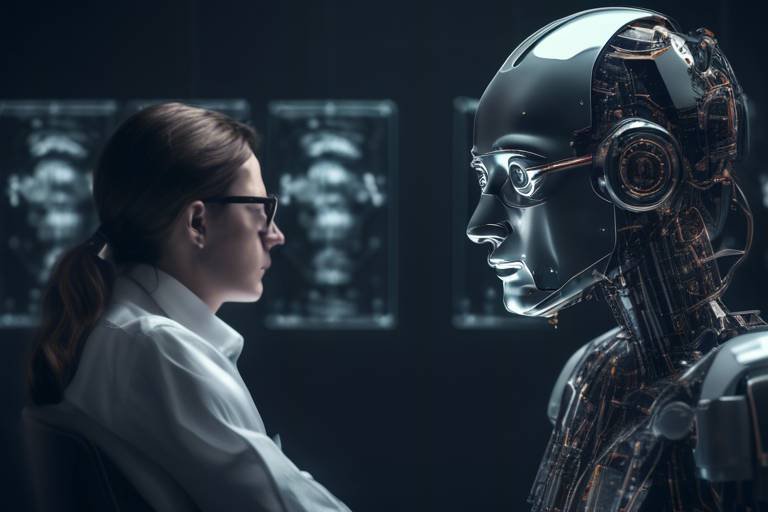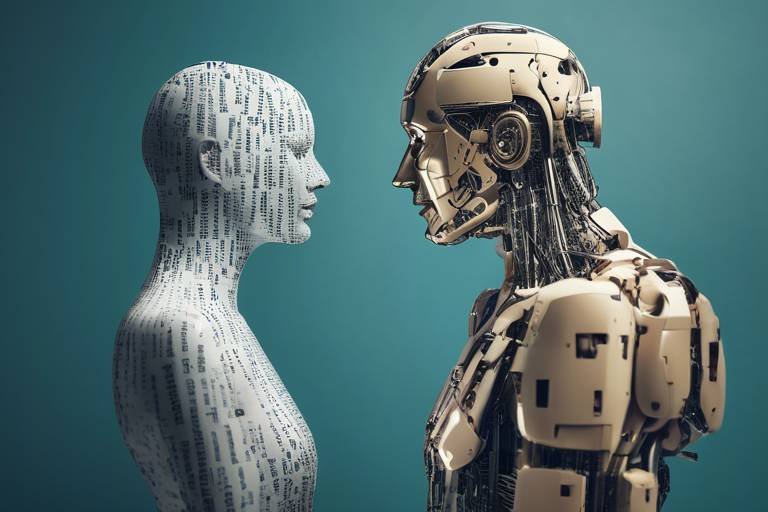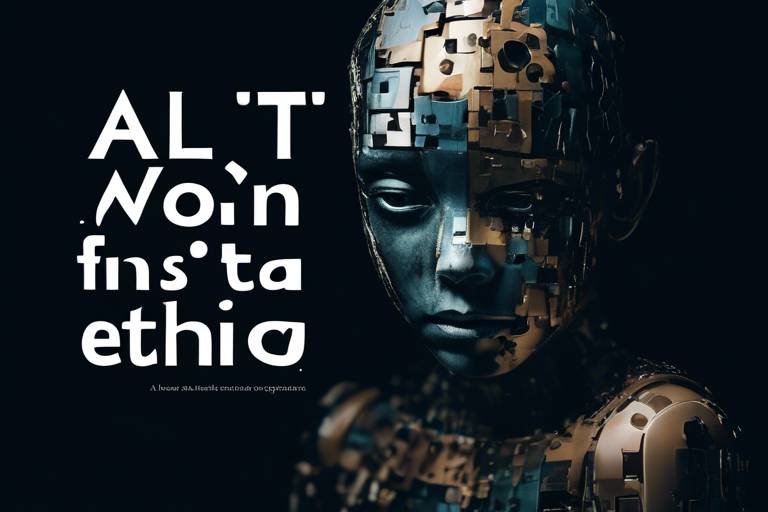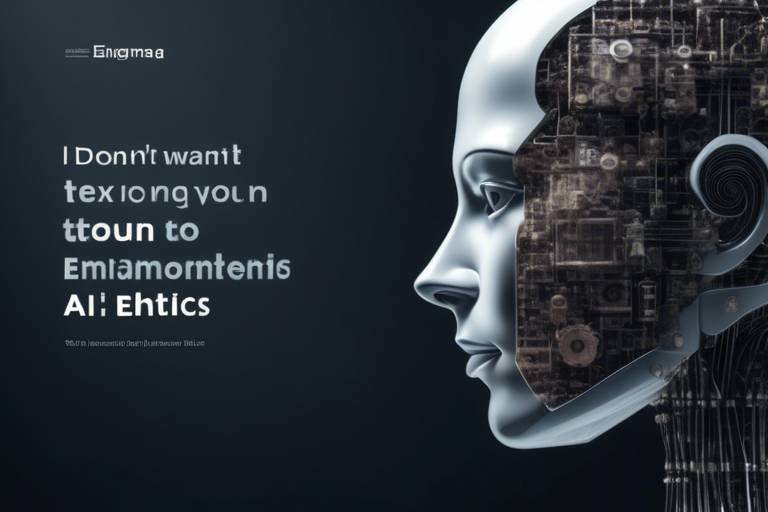Examining AI Ethics Through the Lens of Philosophy
As we stand on the brink of a new era dominated by artificial intelligence, it's crucial to ask ourselves: What ethical frameworks should guide the development and deployment of AI technologies? The intersection of AI and philosophy is not just an academic exercise; it is a pressing concern that affects every aspect of our lives, from the mundane to the profound. The rapid advancements in AI capabilities challenge our traditional ethical paradigms and compel us to rethink what it means to act responsibly in a world where machines can make decisions that impact human lives.
At its core, the examination of AI ethics through philosophy asks us to consider the implications of our technological choices. Are we merely creators of sophisticated tools, or do we bear the weight of moral responsibility for the actions of these tools? The philosophical foundations of AI ethics provide us with various lenses through which we can analyze these questions. By exploring key philosophical theories such as utilitarianism, deontological ethics, and virtue ethics, we can gain insights into how to navigate the ethical dilemmas posed by AI.
In a world increasingly influenced by algorithms and machine learning, we must ask ourselves: How can we ensure that AI systems are designed and implemented in a manner that aligns with our ethical values? This inquiry leads us to explore various frameworks that provide guidance. For instance, utilitarianism focuses on the outcomes of actions, emphasizing the greatest good for the greatest number. On the other hand, deontological ethics stresses the importance of rules and duties, irrespective of the consequences. Finally, virtue ethics encourages us to cultivate moral character and virtues in both AI developers and the systems they create.
This article will delve into these philosophical frameworks, examining their relevance to AI ethics and the implications for society. As we navigate this complex landscape, we must remain vigilant and engaged, ensuring that our technological advancements do not outpace our ethical considerations. After all, the future of AI is not just about the technology itself; it's about the kind of society we want to build and the moral compass that will guide us along the way.
- What is AI ethics? AI ethics refers to the moral principles that guide the development and use of artificial intelligence technologies.
- Why is philosophy important in AI ethics? Philosophy provides frameworks and theories that help us analyze the ethical implications of AI and guide our decision-making processes.
- How can utilitarianism be applied to AI? Utilitarianism can be applied to AI by evaluating the consequences of AI actions and making decisions that maximize overall well-being.
- What role does virtue ethics play in AI development? Virtue ethics emphasizes the character of AI developers and the importance of fostering ethical awareness in creating responsible AI systems.

Philosophical Foundations of AI Ethics
When we dive into the world of artificial intelligence (AI), we quickly realize that it’s not just about algorithms and data. It’s about the ethical frameworks that guide how these technologies interact with society. The philosophical foundations of AI ethics are crucial for understanding the implications of AI on our lives. At the heart of this exploration lies a blend of ancient philosophical theories and modern technological dilemmas, creating a rich tapestry of thought that informs our approach to AI.
To start, let’s consider some key philosophical theories that have significant relevance in the realm of AI ethics:
- Utilitarianism: This theory focuses on the greatest good for the greatest number. It prompts us to evaluate AI decisions based on their outcomes and overall societal impact.
- Deontological Ethics: In contrast, this framework emphasizes rules and duties. It asks us to consider the moral obligations we have towards others, regardless of the consequences.
- Virtue Ethics: This perspective shifts the focus to the character and virtues of the individuals involved in AI development. It raises questions about the moral qualities that developers should embody.
Each of these philosophical lenses provides a unique perspective on the ethical dilemmas posed by AI. For instance, utilitarianism might advocate for AI systems that maximize efficiency and benefit the majority, while deontological ethics would caution against sacrificing individual rights for the sake of collective good. This tension between outcomes and duties is a central theme in AI ethics, challenging us to find a balance that respects both individual rights and societal benefits.
Moreover, the rapid advancement of AI technology necessitates a continual reassessment of these ethical frameworks. As AI systems become more integrated into critical areas such as healthcare, finance, and law enforcement, the stakes are higher than ever. This intersection of technology and ethics prompts us to ask: How can we ensure that AI operates in a morally responsible manner? The answer lies in a robust understanding of these philosophical foundations.
Philosophers like Immanuel Kant have long argued for the importance of treating individuals as ends in themselves, not merely as means to an end. This principle is particularly relevant in AI, where algorithms can potentially dehumanize decision-making processes. As we design AI systems, we must remain vigilant about maintaining human dignity and ensuring that technology serves humanity rather than undermining it.
In addition to traditional philosophical theories, contemporary thinkers are also contributing to the discourse on AI ethics. For example, the concept of algorithmic fairness has emerged as a pressing concern. This idea challenges developers to consider how biases in data can lead to unfair outcomes, reinforcing the need for ethical scrutiny in AI development. It’s a reminder that the philosophical foundations of AI ethics are not merely academic; they have real-world implications that can affect lives.
As we navigate this complex landscape, it’s essential to foster a culture of ethical awareness among AI developers and stakeholders. This involves not only understanding these philosophical frameworks but also actively engaging with them as we create and implement AI technologies. By grounding our work in a strong ethical foundation, we can help ensure that AI contributes positively to society.
In summary, the philosophical foundations of AI ethics provide a critical lens through which we can examine the implications of artificial intelligence. By embracing various ethical theories, we can better navigate the challenges posed by AI and strive for a future where technology and ethics coexist harmoniously.

Utilitarianism and AI Decision-Making
Utilitarianism, a philosophical theory that advocates for actions that maximize overall happiness or well-being, offers a compelling framework for navigating the complex landscape of AI decision-making. As artificial intelligence systems become increasingly integrated into our lives—from healthcare to autonomous vehicles—the ethical implications of their decisions cannot be ignored. The core idea behind utilitarianism is simple: the best action is the one that produces the greatest good for the greatest number. This principle can guide AI developers and users in creating systems that prioritize societal benefits over individual interests.
In the context of AI, utilitarianism can help address several pressing ethical dilemmas. For instance, consider an autonomous vehicle faced with an unavoidable accident scenario. The decision it makes could either prioritize the safety of its passengers or the pedestrians in its path. By applying utilitarian principles, the AI could be programmed to evaluate the potential outcomes of its actions, aiming to minimize harm and maximize overall safety. This approach encourages developers to think critically about the consequences of AI actions, leading to more ethical and responsible decision-making processes.
However, implementing utilitarianism in AI decision-making is not without its challenges. One significant hurdle is the difficulty in measuring outcomes effectively. How do we quantify happiness or well-being? What metrics should be used to evaluate the success of an AI's actions? These questions are not merely academic; they have real-world implications that can affect lives. Moreover, the concept of fairness must also be considered. A system that maximizes overall happiness for the majority might inadvertently marginalize minority groups, leading to ethical concerns about justice and equity.
To further illustrate the application of utilitarianism in AI, let's examine some practical benefits:
- Enhanced Decision-Making: By focusing on outcomes, AI systems can make more informed choices that consider the broader impact on society.
- Prioritization of Resources: Utilitarianism allows for the allocation of resources to areas where they can do the most good, such as in healthcare or disaster response.
- Informed Public Policy: AI systems guided by utilitarian principles can aid policymakers in creating regulations that benefit the majority.
Despite these advantages, the path to integrating utilitarian ethics into AI is fraught with challenges. For instance, developers must grapple with the ethical implications of their algorithms and ensure they do not inadvertently perpetuate biases. Additionally, the need for transparency in AI decision-making becomes paramount; stakeholders must understand how these systems arrive at their conclusions. Therefore, while utilitarianism provides a valuable framework, it requires careful consideration and ongoing dialogue among ethicists, developers, and users alike.
In conclusion, utilitarianism serves as a guiding light for AI decision-making, urging us to prioritize the collective good. By embracing this ethical framework, we can navigate the complexities of AI technology with a focus on maximizing well-being and minimizing harm. As we continue to advance in this field, the integration of utilitarian principles will be crucial in shaping a future where AI serves humanity effectively and ethically.

Benefits of Utilitarian Approaches
Utilitarianism, at its core, is about maximizing happiness and minimizing suffering. When applied to artificial intelligence, this ethical framework offers numerous benefits that can significantly enhance the way AI systems function in society. By prioritizing outcomes that benefit the majority, utilitarian approaches can lead to decisions that not only promote efficiency but also align with the greater good. Imagine a world where AI systems are designed to evaluate the consequences of their actions, ensuring that the results yield the highest possible benefit for the largest number of people. This is the promise of utilitarianism in AI.
One of the primary advantages of adopting a utilitarian perspective in AI development is the focus on measurable outcomes. By establishing clear metrics for success, developers can create AI systems that are not only effective but also socially responsible. For instance, in healthcare, AI can analyze vast amounts of data to determine which treatments yield the best outcomes for patients. This ability to process information and predict results can lead to improved patient care, reduced costs, and ultimately, a healthier society.
Furthermore, utilitarianism encourages transparency in AI algorithms. When developers are guided by the principle of maximizing overall well-being, they are more likely to disclose how their systems make decisions. This transparency builds trust among users and stakeholders, fostering a collaborative environment where AI can thrive. For example, in self-driving cars, understanding the decision-making process can assure passengers that their safety is the top priority, thus enhancing public acceptance of this technology.
Another significant benefit is the adaptability of utilitarian approaches. As societal values and needs evolve, AI systems designed with a utilitarian framework can be adjusted to reflect these changes. This flexibility allows for continuous improvement and alignment with ethical standards. In education, AI can tailor learning experiences to maximize student engagement and success, adapting its methods based on real-time feedback to ensure that the majority of students benefit.
To illustrate these benefits, consider the following table that summarizes how utilitarianism can enhance various sectors:
| Sector | Utilitarian Benefit | Example Application |
|---|---|---|
| Healthcare | Improved patient outcomes | AI-driven diagnostics |
| Transportation | Increased safety | Self-driving vehicles |
| Education | Enhanced learning experiences | Adaptive learning platforms |
In conclusion, the benefits of utilitarian approaches in AI are profound. By focusing on the greater good, enhancing transparency, and allowing for adaptability, utilitarianism can guide the development of AI systems that not only serve their intended purposes but also contribute positively to society. As we continue to navigate the complexities of AI technology, embracing these principles will be crucial in ensuring that our advancements lead to a better future for all.
- What is utilitarianism in AI? Utilitarianism in AI is an ethical framework that emphasizes maximizing overall happiness and minimizing suffering through the decisions made by AI systems.
- How does utilitarianism benefit AI development? It encourages measurable outcomes, transparency, and adaptability, leading to more socially responsible AI systems.
- Can you give an example of utilitarianism in action? In healthcare, AI can analyze data to determine the best treatment options, thereby improving patient outcomes.
- What challenges might arise from utilitarian approaches? Challenges include accurately measuring outcomes and ensuring fairness in decision-making processes.

Challenges in Implementation
Implementing utilitarianism in artificial intelligence (AI) is not as straightforward as it might seem. While the idea of maximizing overall well-being sounds appealing, the reality is fraught with complexities. One of the primary challenges is the difficulty in accurately measuring outcomes. How do we quantify happiness or well-being? Is it through economic metrics, social indicators, or something more subjective? The ambiguity surrounding these measurements creates a significant hurdle for developers who aim to create AI systems that truly reflect utilitarian principles.
Moreover, there is the issue of ensuring fairness in AI-driven decisions. Utilitarianism often necessitates making choices that benefit the majority, but what happens to the minority? In striving for the greatest good, we risk marginalizing certain groups, leading to ethical dilemmas that challenge the very foundation of utilitarian thought. For instance, consider a scenario where an AI system prioritizes resource allocation to a larger population at the expense of a smaller, vulnerable group. This raises questions about whether the ends justify the means, a central tenet of utilitarianism.
Additionally, the dynamic nature of societal values complicates the implementation of utilitarian ethics in AI. What is considered "good" or "beneficial" can evolve over time, influenced by cultural shifts, technological advancements, and changing social norms. This fluidity means that an AI system designed with a specific utilitarian framework may become outdated or misaligned with current values, necessitating constant reevaluation and adjustment.
Finally, there’s the challenge of transparency. Many AI systems operate as "black boxes," making it difficult to understand how decisions are made. This lack of transparency can lead to distrust among users and stakeholders, especially if the outcomes of AI decisions are perceived as unfair or harmful. To truly embrace utilitarianism, AI systems must not only be effective in maximizing well-being but also be transparent in their operations, allowing users to understand and trust the decision-making processes.
In summary, while utilitarianism provides a compelling framework for guiding AI decision-making, its implementation is riddled with challenges. From measuring outcomes and ensuring fairness to adapting to changing societal values and maintaining transparency, developers face a complex landscape. Addressing these challenges is essential for creating AI systems that are not only effective but also ethically sound.
- What is utilitarianism? Utilitarianism is an ethical theory that suggests the best action is the one that maximizes overall happiness or well-being.
- Why is measuring outcomes challenging in AI? Measuring outcomes is difficult due to the subjective nature of happiness and the varying metrics that can be used to assess well-being.
- How can AI ensure fairness in decision-making? Ensuring fairness requires careful design and consideration of diverse perspectives to avoid marginalizing any group.
- What does transparency in AI mean? Transparency in AI refers to the clarity of the decision-making process, allowing users to understand how and why decisions are made.

Case Studies in Utilitarian AI
To truly grasp the impact of utilitarianism in artificial intelligence, we can look at various case studies that highlight its application and effectiveness. These examples not only showcase the potential benefits of utilitarian AI but also provide insights into the challenges and ethical considerations that arise during implementation. One notable instance is the use of AI in healthcare, particularly in predicting patient outcomes. By analyzing vast datasets, AI systems can identify treatments that maximize patient recovery rates while minimizing costs. This approach aligns perfectly with utilitarian principles, as the ultimate goal is to achieve the greatest good for the greatest number of patients.
Another compelling case study can be found in the realm of autonomous vehicles. Companies like Waymo and Tesla have been developing AI-driven cars that must make split-second decisions in complex situations. For instance, when faced with a potential accident, these vehicles utilize algorithms that evaluate various outcomes to minimize harm. In such scenarios, the AI must weigh the potential consequences of its actions, striving to choose the option that maximizes overall safety for passengers, pedestrians, and other road users. This decision-making process exemplifies utilitarian ethics in action, as the AI aims to create the best possible outcome for all involved parties.
Moreover, the application of utilitarian principles has been observed in social media algorithms. Platforms like Facebook and Twitter leverage AI to curate content that maximizes user engagement. While this approach can lead to increased satisfaction and enjoyment for many users, it raises ethical questions about the potential for harm, such as the spread of misinformation. Therefore, it is crucial for developers to balance engagement with ethical considerations, ensuring that the benefits of their algorithms do not come at the expense of societal well-being.
In examining these case studies, we can identify several key takeaways:
- Data-Driven Decisions: The effectiveness of utilitarian AI heavily relies on the quality and breadth of data used for decision-making.
- Balancing Outcomes: Developers must continually assess the outcomes of their AI systems to ensure they are aligned with utilitarian principles.
- Ethical Oversight: Implementing a framework for ethical review can help mitigate potential harms while maximizing benefits.
Ultimately, these case studies exemplify how utilitarian ethics can shape the future of AI, guiding developers and users alike toward more responsible and beneficial outcomes. As we continue to explore the intersection of AI and ethics, it becomes increasingly important to learn from these real-world applications, ensuring that our technological advancements serve the greater good.
Q: What is utilitarianism in the context of AI?
A: Utilitarianism is an ethical framework that evaluates actions based on their consequences, aiming to maximize overall happiness and well-being. In AI, this means designing systems that prioritize outcomes benefiting the majority.
Q: Can AI systems truly make ethical decisions?
A: While AI can be programmed to follow ethical guidelines, the complexity of human values and moral dilemmas means that AI may not always make decisions that align with human ethical standards. Continuous oversight and refinement are necessary.
Q: What are some challenges in implementing utilitarian AI?
A: Key challenges include measuring outcomes accurately, ensuring fairness in decision-making, and addressing potential biases in data that could skew results.
Q: How can developers ensure their AI systems are ethically sound?
A: Developers can adopt ethical frameworks, engage in regular audits, and involve diverse stakeholders in the design process to better understand the implications of their systems.

Deontological Ethics and AI Responsibilities
When we delve into the realm of deontological ethics, we're stepping into a world where the focus shifts from the outcomes of actions to the inherent morality of those actions themselves. In the context of artificial intelligence, this ethical framework emphasizes the importance of rules, duties, and obligations that AI developers and users must adhere to. Imagine a world where every decision made by an AI system is governed by a strict set of ethical rules—this is the essence of deontological ethics.
At its core, deontological ethics posits that certain actions are morally obligatory, regardless of their consequences. This means that AI systems should be designed and operated in a way that respects fundamental rights and duties. For instance, an AI developed for healthcare should prioritize patient privacy and informed consent, adhering to ethical standards that protect individual rights. The challenge, however, lies in defining these rules clearly and ensuring that AI systems are capable of adhering to them consistently.
One of the primary responsibilities of AI developers is to establish a robust framework of ethical guidelines that govern AI behavior. This involves not only understanding the legal implications of AI actions but also recognizing the moral duties that come with creating intelligent systems. Developers must ask themselves critical questions, such as: What are the ethical implications of my AI's decisions? Are we respecting the rights of individuals affected by these decisions? By answering these questions, developers can better navigate the complex landscape of AI ethics.
Moreover, the responsibilities of AI extend beyond just the developers. Users of AI systems also play a crucial role in ensuring ethical compliance. For example, a company utilizing AI for hiring decisions must ensure that their algorithms do not perpetuate biases or violate anti-discrimination laws. This shared responsibility creates a collaborative environment where both developers and users must work together to uphold ethical standards.
To illustrate the significance of deontological ethics in AI, consider the following table that outlines key responsibilities for both AI developers and users:
| Role | Responsibilities |
|---|---|
| AI Developers |
|
| AI Users |
|
In conclusion, deontological ethics serves as a critical foundation for understanding the responsibilities associated with AI. By prioritizing duties and moral obligations, we can ensure that AI systems operate within an ethical framework that respects individual rights and societal norms. As we continue to advance in the field of artificial intelligence, fostering a culture of ethical responsibility among both developers and users will be essential in navigating the challenges that lie ahead.
- What is deontological ethics? Deontological ethics is an ethical framework that focuses on the morality of actions based on rules and duties rather than the consequences of those actions.
- How does deontological ethics apply to AI? In AI, deontological ethics emphasizes the importance of ethical guidelines and responsibilities for developers and users to ensure that AI systems operate within moral boundaries.
- What are the responsibilities of AI developers? AI developers are responsible for establishing ethical guidelines, ensuring transparency, and prioritizing user privacy in the design and implementation of AI systems.
- What role do AI users play in ethical AI? AI users must utilize AI systems responsibly, monitor outputs for ethical compliance, and report any unethical behavior exhibited by AI systems.

Virtue Ethics in AI Development
When we think about the future of artificial intelligence, it’s easy to get lost in the technicalities—algorithms, data sets, and machine learning models. However, at the heart of these advancements lies a fundamental question: What kind of character do we want our AI systems to embody? This is where virtue ethics steps in, emphasizing the importance of moral character and virtues in guiding the development and deployment of AI technologies. Unlike other ethical frameworks that focus solely on the consequences of actions or adherence to rules, virtue ethics encourages us to consider the qualities and dispositions that AI developers should cultivate.
Imagine a world where AI systems not only perform tasks efficiently but also reflect the best aspects of human character, such as fairness, honesty, and empathy. By integrating virtue ethics into AI development, we can create systems that not only solve problems but do so in a manner that aligns with our shared human values. This approach is particularly crucial as AI systems increasingly influence our lives, from healthcare to finance, and even in our social interactions.
One of the key components of virtue ethics is the idea that moral virtues are developed through practice and habituation. In the context of AI, this means that the developers and designers of AI systems must actively embody and promote these virtues throughout the design process. For instance, a developer who values transparency is more likely to create an AI system that provides clear explanations of its decision-making processes, thereby fostering trust among users. This leads us to the question: How can we ensure that AI designers are equipped with the right virtues?
To address this, organizations and educational institutions can implement training programs centered around ethical awareness and character development. These programs can include workshops, mentorship opportunities, and collaborative projects that emphasize the importance of virtues in technology. By fostering an environment where ethical considerations are paramount, we can encourage developers to prioritize moral virtues in their work.
Furthermore, integrating virtue ethics into AI systems can also be achieved through careful selection of training data and algorithmic design. For example, AI systems trained on data that reflects a diverse range of human experiences and perspectives can develop a more nuanced understanding of fairness and justice. This, in turn, can lead to more equitable outcomes in AI decision-making processes.
In essence, virtue ethics serves as a guiding light in the complex landscape of AI development. It challenges us to think beyond mere functionality and efficiency, urging us to consider the broader implications of our technological choices. By fostering a culture of ethical awareness among AI developers and integrating virtuous principles into AI training processes, we can pave the way for a future where AI not only enhances our lives but also upholds the values we cherish as a society.
- What is virtue ethics? Virtue ethics is an ethical framework that emphasizes the importance of moral character and virtues in guiding behavior, rather than focusing solely on the consequences of actions or adherence to rules.
- Why is virtue ethics important in AI development? Virtue ethics encourages developers to cultivate qualities such as fairness, honesty, and empathy, leading to the creation of AI systems that reflect these values and promote ethical outcomes.
- How can AI developers cultivate virtues? AI developers can cultivate virtues through training programs, workshops, and mentorship opportunities that emphasize ethical awareness and character development.
- Can AI systems be trained to embody virtues? Yes, AI systems can be trained using diverse data sets and algorithmic designs that reflect human values, helping them to make more ethical decisions.

Importance of Ethical AI Designers
When we think about artificial intelligence, we often picture sleek robots or advanced algorithms performing complex tasks. However, the real magic—or potential mayhem—lies in the hands of the designers who create these systems. The importance of ethical AI designers cannot be overstated; they are the architects of the digital world we are rapidly building. Just as a skilled architect considers the safety and sustainability of a building, AI designers must prioritize ethical considerations that impact society at large.
Why is this so crucial? Imagine a world where AI systems make decisions without any moral compass. It could lead to outcomes that, while efficient, may not necessarily be fair or just. For instance, consider an AI used in hiring processes. If the designers do not incorporate ethical guidelines, the system could inadvertently perpetuate biases, leading to discrimination against certain groups. Thus, ethical AI designers serve as the gatekeepers, ensuring that the technology aligns with societal values and promotes fairness.
Furthermore, the character and intentions of AI designers play a significant role in shaping the ethical landscape of AI systems. When designers are trained to be aware of the ethical implications of their work, they become more likely to create systems that prioritize human welfare. This means that fostering an environment that encourages ethical awareness is essential. Companies and educational institutions should actively promote ethical training and discussions, creating a culture where ethical considerations are seen as integral to the design process.
To illustrate this point, consider the following table that outlines the key traits of effective ethical AI designers:
| Trait | Description |
|---|---|
| Empathy | The ability to understand and share the feelings of others, crucial for designing user-friendly and fair systems. |
| Critical Thinking | The capacity to analyze situations and consider the broader implications of AI decisions. |
| Integrity | Commitment to ethical principles, ensuring that decisions are made with honesty and respect for all stakeholders. |
| Courage | The willingness to challenge norms and advocate for ethical practices, even when faced with resistance. |
In conclusion, the importance of ethical AI designers extends beyond mere technical skills. They must embody a set of values that prioritize the well-being of individuals and society as a whole. As we continue to integrate AI into various aspects of our lives, the responsibility falls on these designers to ensure that the technology serves humanity rather than undermines it. After all, a well-designed AI system can be a powerful tool for good, but it requires ethical designers to guide it along the right path.
- What is the role of ethical AI designers? Ethical AI designers are responsible for creating AI systems that prioritize fairness, transparency, and accountability, ensuring that technology aligns with societal values.
- How can ethical considerations be integrated into AI design? Ethical considerations can be integrated through training, awareness programs, and encouraging discussions about the implications of AI technologies in various contexts.
- Why is empathy important in AI design? Empathy helps designers understand the needs and concerns of users, leading to more user-friendly and equitable AI systems.

Training AI with Virtue Ethics
When we talk about training AI with virtue ethics, we're diving into a fascinating realm where moral character becomes central to the development of intelligent systems. Unlike traditional models that often focus solely on outcomes or rules, virtue ethics emphasizes the importance of the individual's character and the virtues they embody. This approach encourages us to ask not just what an AI should do, but what kind of character it should have. Imagine if AI could learn to be compassionate, fair, and responsible—attributes that are essential for navigating complex human interactions.
To effectively integrate virtue ethics into AI training, developers can adopt various methodologies. One promising approach is to create training datasets that reflect virtuous behavior. For instance, curating examples of ethical decision-making in real-world scenarios can help AI systems learn from human role models. These datasets can include narratives, dialogues, and case studies that showcase virtues like honesty, empathy, and courage. By exposing AI to these rich examples, we can nurture a system that not only understands the rules of engagement but also embodies a sense of moral responsibility.
Moreover, incorporating virtue-based reinforcement learning can further enhance the training process. In this model, AI systems are rewarded not just for achieving specific outcomes but for demonstrating virtuous behavior during their training. For example, an AI designed to assist in customer service could be rewarded for showing empathy in its responses, encouraging it to prioritize customer satisfaction over mere efficiency. This method can create a feedback loop where AI learns to value virtues in its decision-making processes.
However, the journey of training AI with virtue ethics is not without its challenges. One significant hurdle is defining what constitutes a virtue in a way that is universally accepted. Different cultures and communities may have varying interpretations of virtues, making it essential to establish a common framework that respects diversity while promoting ethical behavior. This is where interdisciplinary collaboration comes into play, combining insights from philosophy, psychology, and cultural studies to create a comprehensive training program.
In conclusion, training AI with virtue ethics holds immense potential for shaping the future of technology. By focusing on character development and moral virtues, we can create AI systems that are not only intelligent but also ethical. This shift in perspective encourages us to rethink our approach to AI design, emphasizing the importance of nurturing responsible AI that aligns with human values and societal good.
- What is virtue ethics? Virtue ethics is an ethical theory that emphasizes the role of character and virtues in moral philosophy, focusing on what kind of person one should be rather than merely on rules or consequences.
- How can AI embody virtues? AI can embody virtues by being trained on datasets that include examples of ethical behavior and by using reinforcement learning to reward virtuous actions.
- What challenges are associated with training AI using virtue ethics? One major challenge is the lack of universally accepted definitions of virtues, which can vary across cultures and communities.
- Why is it important to integrate virtue ethics into AI? Integrating virtue ethics into AI is crucial for developing systems that not only function effectively but also align with human values and contribute positively to society.
Frequently Asked Questions
- What is AI ethics and why is it important?
AI ethics refers to the moral implications and responsibilities surrounding the development and deployment of artificial intelligence. It's crucial because as AI technologies advance, they impact society in profound ways, affecting privacy, security, and even human rights. Understanding these ethical considerations helps ensure that AI is used responsibly and for the greater good.
- How does utilitarianism apply to AI decision-making?
Utilitarianism is a philosophical framework that evaluates actions based on their consequences, aiming to maximize overall happiness. In AI decision-making, this means designing systems that prioritize outcomes benefiting the majority. However, it raises questions about how to measure happiness and fairness in complex scenarios, making it a challenging yet vital approach.
- What are the challenges of implementing utilitarian ethics in AI?
Implementing utilitarian ethics in AI can be tricky. One major challenge is quantifying and measuring the outcomes of AI actions accurately. Additionally, ensuring that the benefits are distributed fairly among different groups can be difficult, as some may be left out or adversely affected by decisions made in the name of the greater good.
- Can you provide examples of utilitarianism in AI?
Absolutely! One notable example is in healthcare AI systems, where algorithms are designed to prioritize treatments that yield the best overall patient outcomes. Another example is in self-driving cars, where decision-making algorithms must assess potential accidents and choose actions that minimize harm to the most people involved.
- What is deontological ethics and how does it relate to AI?
Deontological ethics focuses on the morality of actions themselves rather than their outcomes. In the context of AI, this means that developers and users have specific duties and responsibilities, such as ensuring that AI systems respect user privacy and do not cause harm, regardless of the potential benefits.
- How can virtue ethics influence AI development?
Virtue ethics emphasizes the importance of moral character and virtues. In AI development, fostering a culture of ethical awareness among designers can lead to more responsible AI behavior. By instilling virtues like honesty, fairness, and empathy, developers can create AI systems that align better with human values.
- Why is the character of AI designers important?
The character of AI designers is crucial because their ethical awareness directly influences the outcomes of AI systems. If designers prioritize ethical considerations, the resulting AI will likely reflect those values, leading to better societal impacts. Conversely, neglecting ethics can result in harmful technologies.
- How can virtue ethics be integrated into AI training?
Integrating virtue ethics into AI training can involve developing algorithms that mimic virtuous behaviors or using training data that reflects ethical decision-making. This approach encourages AI systems to act in ways that align with human moral standards, ultimately leading to more responsible and trustworthy AI solutions.



















